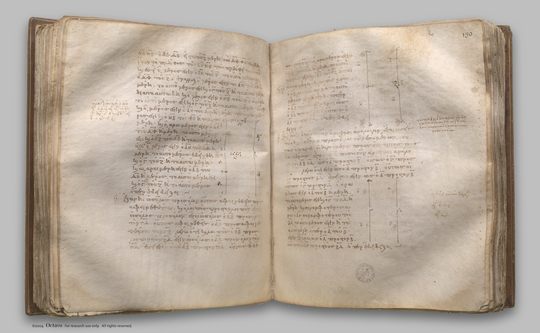index prev next | digilib folio 134

If there be as many numbers as we please in proportion, then, as one of the antecedents is to one of the consequents, so are all the antecedents to all the consequents.
| Ἐὰν ὦσιν ὁποσοιοῦν ἀριθμοὶ ἀνάλογον, ἔσται ὡς εἷς τῶν ἡγουμένων πρὸς ἕνα τῶν ἑπομένων, οὕτως ἅπαντες οἱ ἡγούμενοι πρὸς ἅπαντας τοὺς ἑπομένους. Ἔστωσαν ὁποσοιοῦν ἀριθμοὶ ἀνάλογον οἱ Α, Β, Γ, Δ, ὡς ὁ Α πρὸς τὸν Β, οὕτως ὁ Γ πρὸς τὸν Δ: λέγω, ὅτι ἐστὶν ὡς ὁ Α πρὸς τὸν Β, οὕτως οἱ Α, Γ πρὸς τοὺς Β, Δ. Ἐπεὶ γάρ ἐστιν ὡς ὁ Α πρὸς τὸν Β, οὕτως ὁ Γ πρὸς τὸν Δ, ὃ ἄρα μέρος ἐστὶν ὁ Α τοῦ Β ἢ μέρη, τὸ αὐτὸ μέρος ἐστὶ καὶ ὁ Γ τοῦ Δ ἢ μέρη. καὶ συναμφότερος ἄρα ὁ Α, Γ συναμφοτέρου τοῦ Β, Δ τὸ αὐτὸ μέρος ἐστὶν ἢ τὰ αὐτὰ μέρη, ἅπερ ὁ Α τοῦ Β. ἔστιν ἄρα ὡς ὁ Α πρὸς τὸν Β, οὕτως οἱ Α, Γ πρὸς τοὺς Β, Δ: ὅπερ ἔδει δεῖξαι. | If there be as many numbers as we please in proportion, then, as one of the antecedents is to one of the consequents, so are all the antecedents to all the consequents. Let A, B, C, D be as many numbers as we please in proportion, so that, as A is to B, so is C to D; I say that, as A is to B, so are A, C to B, D. For since, as A is to B, so is C to D, whatever part or parts A is of B, the same part or parts is C of D also. [VII. Def. 20] Therefore also the sum of A, C is the same part or the same parts of the sum of B, D that A is of B. [VII. 5, 6] |